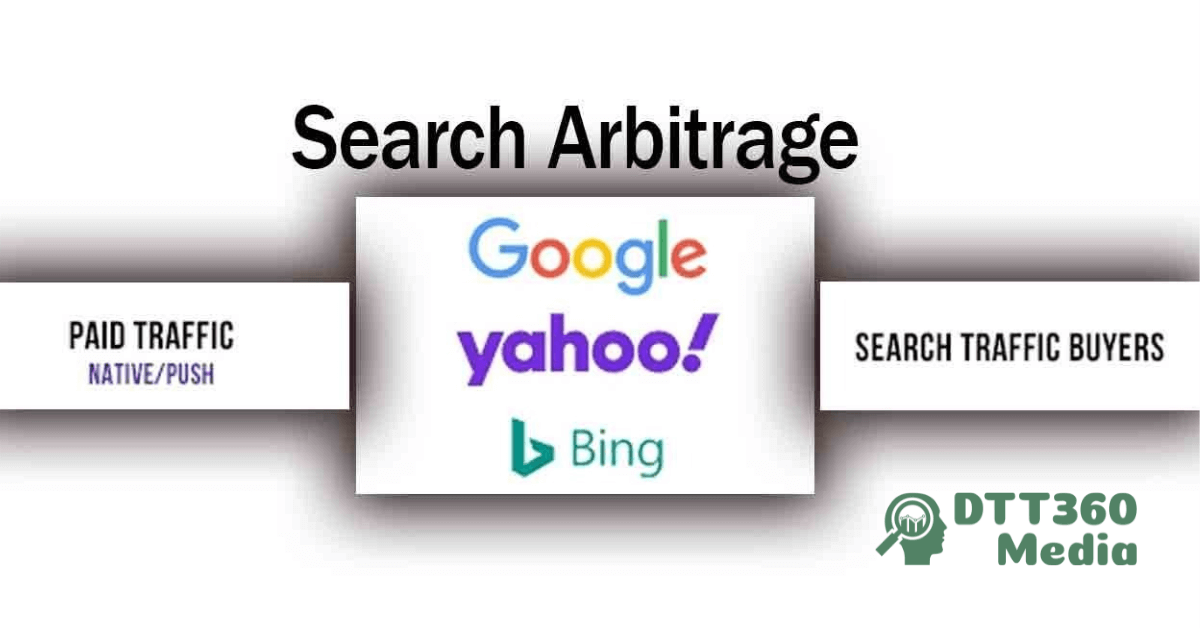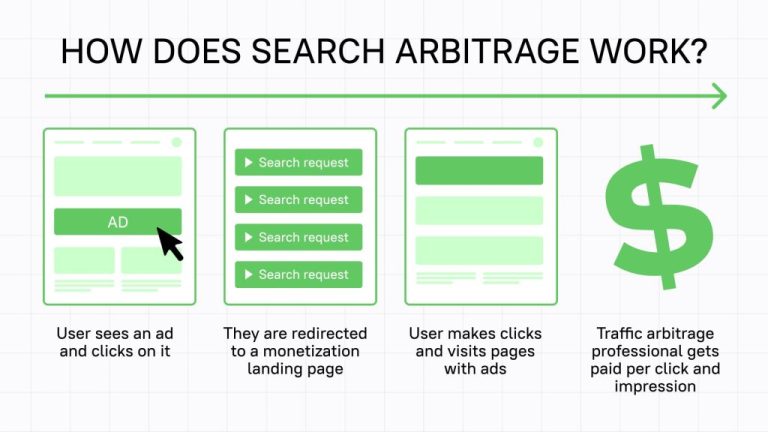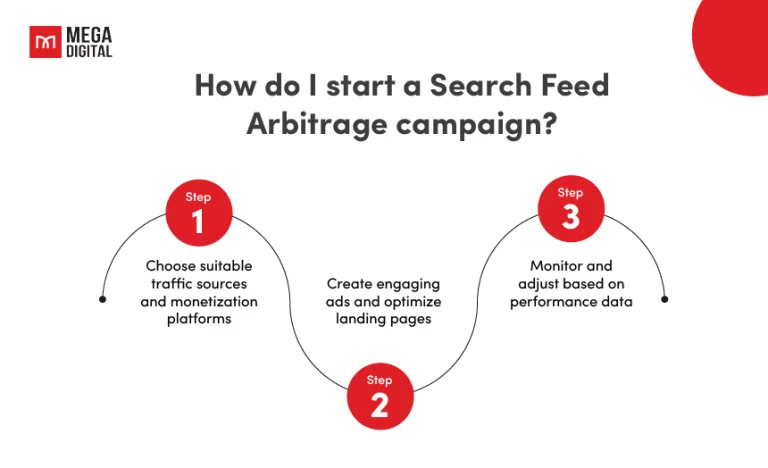What is Search Arbitrage? Learn effective search arbitrage strategies
Have you ever wondered how search engines make money? Well, one interesting way they do it is through a practice called search arbitrage. It’s a strategy where advertisers buy low-cost keywords on one search engine and then use those keywords to display ads on another search engine, earning a profit from the difference in advertising costs. Search arbitrage is a clever way for advertisers to maximize their return on investment while search engines benefit from increased ad revenue.
What is Search Arbitrage?
You may have heard of the term “Search Arbitrage”, but what does it mean? In simple terms, it refers to a process where an individual or a company takes advantage of the price difference between the cost of advertising on a search engine and the revenue earned from the ads displayed on their website.
Let’s say you have a website that displays ads from Google AdSense. When someone visits your website and clicks on an ad, you earn a certain amount of money. Now, if you can generate traffic to your website by bidding on popular keywords on search engines like Google or Bing, and the revenue earned from the ads displayed on your website is higher than the cost of advertising, you are essentially making a profit through search arbitrage.
While this may sound like a straightforward concept, implementing search arbitrage successfully requires careful planning, keyword research, and optimization of your website for maximum ad revenue. It’s a strategy that can be lucrative if done right, but it also comes with risks and challenges.
Key Takeaways
- Search arbitrage involves leveraging the price discrepancy in keywords across different search platforms.
- It allows you to profit by buying low-cost keywords on one platform and selling them at a higher price on another.
- By optimizing your ad campaigns and targeting specific niches, you can maximize your returns from search arbitrage.
- It’s important to closely monitor your ad performance and adjust your strategies accordingly to stay profitable.
- Search arbitrage can be a lucrative opportunity for experienced marketers, but it requires careful planning and execution.
Search arbitrage has a fascinating history. It dates back to the early 2000s when search engines like Google and Yahoo were gaining popularity. Advertisers realized the potential to capitalize on this growing trend. By buying keywords at a low cost and redirecting traffic to a different search engine with higher ad revenue, they could generate a substantial profit. Statistics show that search arbitrage can generate an average profit margin of 30-40%, making it an attractive business opportunity for savvy advertisers. This practice continues to evolve as search engines refine their algorithms to detect and prevent arbitrage, highlighting the importance of staying ahead of the game in this ever-changing landscape.
Looking to make some extra money online? Search Arbitrage is a profitable strategy that you should try. Here’s how it works:
- Find high-performing keywords with low competition.
- Create quality content around those keywords.
- Use SEO techniques to rank your content on search engines.
- Drive traffic to your content through paid ads or social media.
- Monetize your website with ads or affiliate marketing.
Understanding Search Arbitrage: A Profitable Online Advertising Strategy
Search arbitrage is an online advertising strategy that involves leveraging the discrepancies in the cost of search engine advertisements and the revenue generated from directing traffic to a website. This practice allows advertisers to generate a profit by bidding on low-cost keywords and monetizing the resulting traffic through contextual advertising or other revenue-generating methods. In this article, we will delve into the various aspects of search arbitrage, including how it works, its benefits, and potential risks involved.
How Search Arbitrage Works
Search arbitrage revolves around understanding the dynamics of online advertising, search engine algorithms, and user intent. The process starts by identifying low-cost keywords with significant search volume and high commercial value. Advertisers bid on these keywords in search engine advertising platforms, such as Google Ads, to drive traffic to their own website or landing page.
Once a user clicks on the ad, they are directed to a landing page that contains relevant content or an offer that aligns with their search query. The landing page may also include advertisements or affiliate links, allowing the advertiser to monetize the traffic generated from the initial click. Advertisers rely on the revenue generated from these secondary sources, such as pay-per-click ads, to offset the cost of the initial click and generate a profit.
The success of search arbitrage depends on several factors, including the advertiser’s ability to optimize keyword selection, create compelling ad copy, and design effective landing pages. It also relies on the advertiser’s ability to generate enough revenue from secondary sources to cover the costs of the initial click and generate a profit. Continuous monitoring, testing, and refinement are crucial to optimizing the effectiveness and profitability of search arbitrage campaigns.
While search arbitrage can be a lucrative strategy when executed effectively, it requires a deep understanding of online advertising and user behaviour. It also involves a level of risk due to potential changes in search engine algorithms, increasing competition for keywords, and the quality score assigned to ads and landing pages by search engines. Advertisers must stay updated on industry trends and best practices to adapt their strategies accordingly.
Benefits of Search Arbitrage
Search arbitrage offers several benefits for advertisers who are willing to invest the time and effort to implement it effectively. Here are some key advantages:
- Profitability: When executed well, search arbitrage can be highly profitable, providing advertisers with a lucrative revenue stream.
- Cost-effectiveness: By bidding on low-cost keywords, advertisers can minimize their ad spending while maximizing returns.
- Leveraging search engine algorithms: Advertisers who understand search engine algorithms can align their campaigns with user intent, increasing the likelihood of conversion and revenue generation.
- Flexibility: Search arbitrage allows advertisers to experiment with different keywords, ad copy, and landing page designs to optimize performance.
These benefits make search arbitrage an attractive strategy for advertisers looking to generate additional revenue from their online advertising efforts.
Risks and Challenges of Search Arbitrage
While search arbitrage can be highly profitable, it is not without risks and challenges. Here are some considerations for advertisers:
- Competition: As more advertisers enter the search arbitrage space, competition for low-cost keywords increases, driving up costs and potentially reducing profit margins.
- Search engine algorithm changes: Search engines regularly update their algorithms, affecting ad rankings and quality scores. Advertisers must stay informed and adapt their strategies accordingly.
- Quality score and ad relevance: Advertisers must ensure their ads and landing pages align with search query intent to maintain a high-quality score and ad relevance, which can impact ad performance and cost per click.
Staying ahead of these risks and challenges requires ongoing monitoring and optimization of campaigns. Advertisers should also diversify their revenue streams to mitigate potential losses.
Legal and Ethical Considerations
While search arbitrage can be a legitimate online advertising strategy, there are legal and ethical considerations that advertisers must adhere to. Violations of search engine advertising policies, such as deceptive advertising practices or misleading content, can result in account suspensions or other penalties. Advertisers should ensure their campaigns comply with relevant regulations and guidelines to maintain a positive reputation and long-term success.
Furthermore, transparency and user experience should be prioritized to build trust with users. Advertisers should provide value-driven content and disclose any sponsored or affiliate links to ensure transparency and maintain ethical practices in search arbitrage.
Seeking legal advice and staying informed about industry best practices can help advertisers navigate the legal and ethical landscape of search arbitrage.
Maximizing the Potential of Search Arbitrage through Strategic Implementation
Search arbitrage is a dynamic and evolving online advertising strategy that requires a strategic approach for optimal results. Here, we explore key aspects to consider when implementing search arbitrage:
Keyword Research and Selection
Effective keyword research and selection are essential for search arbitrage success. Here’s how you can identify relevant keywords:
- Identify user intent: Understand the motivation behind users’ search queries to align your content or offers with their needs.
- Utilize keyword research tools: Tools like Google Keyword Planner, SEMrush, and Moz Keyword Explorer can provide insights into the search volume, competition, and commercial value of keywords.
- Consider long-tail keywords: Long-tail keywords are more specific and cater to users with higher purchase intent.
- Monitor industry trends: Stay updated on industry trends and changes in search behaviour to identify emerging keyword opportunities.
Thorough keyword research will help you identify low-cost keywords with the potential for high traffic and revenue generation.
Creating Relevant and Compelling Ads
To maximize clicks and conversions, create compelling and relevant ads that align with user intent. Consider the following tips:
- Use targeted ad copy: Craft ad copy that communicates the benefits or solutions your product or service offers, addressing the user’s search intent.
- Highlight unique selling propositions (USPs): Differentiate your ads by emphasizing what sets your business apart from competitors.
- Include a clear call-to-action (CTA): Direct users to take a specific action, such as making a purchase, signing up for a newsletter, or contacting your business.
Compelling ad copy increases the chances of attracting clicks and driving targeted traffic to your landing page.
Optimize Landing Pages for Conversion
The effectiveness of search arbitrage relies on the performance of your landing pages. Consider the following optimization strategies:
- Relevance and alignment: Ensure that your landing page content aligns with the user’s search query and ad copy.
- Clear value proposition: Communicate the benefits or value that users will gain by engaging with your website or offers.
- Streamlined user experience: Make it easy for users to navigate your landing page and take the desired action, minimizing distractions and friction points.
Regularly monitor and test your landing page performance to optimize conversion rates and maximize revenue.
Monitoring and Optimization
Continuous monitoring and optimization are key to the success of search arbitrage campaigns. Here’s what you should focus on:
- Tracking key metrics: Monitor metrics such as click-through rate (CTR), conversion rate, cost per acquisition (CPA), and revenue per click (RPC) to assess campaign performance.
- A/B testing: Test different ad variations, landing page designs, and calls to action to identify the most effective combinations.
- Refining keyword bids: Regularly review and adjust keyword bids based on their performance to optimize returns.
- Staying updated: Stay informed about industry trends, changes in ad platforms’ policies, and search engine algorithm updates to adapt your strategies accordingly.
By consistently monitoring and optimizing your campaigns, you can maximize the potential of search arbitrage and drive continuous growth and profitability.
Check out more about Search arbitrage
In Conclusion
Search arbitrage is a profitable online advertising strategy that leverages the discrepancies in search engine advertising costs and revenue generated from directing traffic. By effectively implementing search arbitrage, advertisers can generate profits by bidding on low-cost keywords and monetizing the resulting traffic. However, it is essential to understand the dynamics of online advertising, user behaviour, and search engine algorithms to succeed in this strategy.
While search arbitrage offers benefits such as profitability, cost-effectiveness, and flexibility, it also comes with risks and challenges, including increased competition and potential changes in search engine algorithms. Advertisers must stay informed, monitor their campaigns, and optimize continuously to mitigate these risks and maximize the potential of search arbitrage.
By conducting thorough keyword research, creating compelling ads, and optimizing landing pages for conversion, advertisers can strategically implement search arbitrage and drive profitable results. Ongoing monitoring, testing, and optimization are crucial for maintaining the performance of search arbitrage campaigns and adapting to industry trends.
Frequently Asked Questions
Here are some frequently asked questions about Search Arbitrage:
1. What is Search Arbitrage?
Search Arbitrage involves purchasing paid search traffic from search engines, such as Google or Bing, and earning revenue by displaying ads or promoting products and services on your website. Essentially, it’s a strategy to profit from the difference between the cost of acquiring traffic and the revenue generated from that traffic.
Let’s say you buy clicks from a search engine at $0.50 each and earn $1.00 from ads or product sales for every click. The $0.50 difference is your profit margin, which makes Search Arbitrage an attractive opportunity for online entrepreneurs.
2. How does Search Arbitrage work?
To engage in Search Arbitrage, you need to follow these steps:
1. Choose a profitable niche or industry with high search traffic.
2. Set up a website or landing page to drive traffic.
3. Research popular keywords and bid for them in search engine advertising platforms like Google Ads.
4. Create compelling ads that entice users to click and visit your website.
5. Monetize your website by displaying relevant ads or promoting products and services.
By carefully managing bid prices, ad performance, and revenue generated, you can maximize your profit in Search Arbitrage.
3. What are the risks of Search Arbitrage?
While Search Arbitrage can be profitable, it’s important to be aware of the risks involved:
1. Fluctuating ad costs: The cost of acquiring search traffic can vary, impacting your profit margins.
2. Changing ad policies: Search engines may update their advertising policies, affecting your ability to display ads.
3. Quality limitations: Displaying low-quality ads or promoting shady products can harm your website’s reputation.
4. Competition: Other advertisers may bid higher for the same keywords, making it more challenging to generate profit.
It’s essential to stay informed, adapt to changes, and maintain the quality and relevance of your ads and website content to mitigate these risks.
4. Is Search Arbitrage legal?
Yes, Search Arbitrage is a legitimate business strategy. However, it’s important to comply with search engine advertising policies and guidelines. Violating these policies can lead to account suspension or other penalties.
Ensure that your ads and website content are relevant, honest, and provide value to users. Additionally, stay updated on any policy changes from search engines to avoid any compliance issues.
5. How can I optimize my Search Arbitrage strategy?
To optimize your Search Arbitrage strategy and increase profitability, consider the following tips:
1. Conduct keyword research to identify high-performing keywords with lower bid prices.
2. Continuously monitor and analyze your ad performance to identify areas for improvement.
3. Improve your website’s user experience to increase visitor engagement and conversion rates.
4. Experiment with different ad formats, placements, and targeting options to optimize revenue.
5. Stay informed about industry trends and user behaviour to adapt your strategy accordingly.
By constantly refining your Search Arbitrage approach, you can maximize your profits and stay ahead of the competition.
To summarize, search arbitrage is a strategy used by online advertisers to profit from the discrepancies in search engine advertising costs. It involves buying low-cost ad placements and then directing the traffic to more valuable websites to generate revenue. However, search arbitrage can be risky and is frowned upon by search engines due to its potential for low-quality user experiences and misleading practices.
While search arbitrage may seem like a lucrative opportunity, it is important to approach it with caution and adhere to ethical and legal guidelines. It is crucial to provide value to users by delivering relevant and high-quality content, rather than focusing solely on generating revenue. By doing so, you can build a sustainable online advertising strategy that benefits both advertisers and users in the long run.






